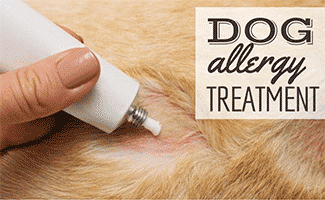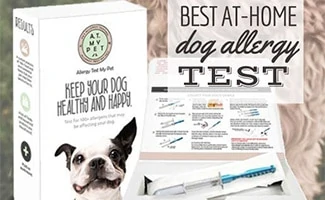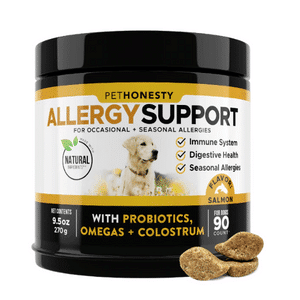What is the best allergy relief for dogs

Types of Dog Allergies and How to Treat Them
Have you heard someone tell you that their dog has allergies? Has your veterinarian suggested that allergies could be a problem for your dog? Do you suspect that your dog has allergies? If so, then youve probably realized that allergies in dogs are not quite as simple as we might wish. For starters, there are several different types of allergies that could be causing your dogs symptoms.
Allergies are a misguided reaction to foreign substances by the bodys immune system, which, of course, people and pets can suffer from. There are quite a few different types of allergies in dogs. Skin allergies, food allergies, and environmental allergens all pose challenges for dogs and their owners, and to make things more complicated, the symptoms of all these different types of allergies can overlap.
Symptoms of Allergies in Dogs
The symptoms of allergies in dogs may vary depending on the cause. A dog that goes into anaphylactic shock, for instance, will have a drop in blood pressure followed by shock, which is very different from a skin condition.
In general, however, the following symptoms could be a sign of an allergic reaction.
- Itchiness
- Hives
- Swelling of the face, ears, lips, eyelids, or earflaps
- Red, inflamed skin
- Diarrhea
- Vomiting
- Sneezing
- Itchy ears
- Chronic ear infections
- Itchy, runny eyes
- Constant licking
Some of these symptoms could also be a sign of another condition. Make an appointment with your veterinarian if you notice changes in their behavior to get an accurate diagnosis.
Types of Allergic Reactions in Dogs
Allergic Dermatitis in Dogs
Skin allergies in dogs, known as allergic dermatitis, is the most common type of allergic reaction in dogs. Skin allergies in dogs are mainly caused by one of three things: fleas, food allergies, and atopicor environmentalallergies.Flea allergy dermatitis is an allergic reaction to fleabites, and some dogs are allergic to flea saliva, which can cause their skin to become red, inflamed, or scabbed because their skin will feel extremely itchy. Its the easiest type of allergic dermatitis to treat, since you can apply flea medication for dogs to help heal their skin.
Another cause of skin allergy in dogs is from food allergies and sensitivities. Just like humans can be allergic to certain foods or ingredients, dogs can be allergic, which can cause itchy skin. Dogs with food allergies usually have itchy ears or paws, sometimes along with gastrointestinal symptoms. Dr. Klein, Chief Veterinary Officer for the AKC, says that food allergies are not as common as you might think. True food allergies result in an immune response, which can range in symptoms from hives, facial swelling, and itchiness to gastrointestinal signs like vomiting and diarrhea or a combination of both.
Environmental allergens can also affect the skin and be the cause of allergic dermatitis. Things like dust, pollen, fungus, and mold can cause these reactions, but in most cases, these allergies are seasonal. As with food allergies that affect the skin, the most commonly affected areas are the paws and ears (but also include the wrists, ankles, muzzle, underarms, groin, around the eyes, and in between the toes).
All skin allergies pose the risk of secondary infection. As your dog scratches, bites, and licks at his skin, he risks opening up his skin to yeast and bacterial infections that may require treatment.
Urticaria, or Hives, in Dogs
Also known as urticaria, hives on dogs are very itchy but are not life-threatening. Hives appear as a reaction anywhere from 6 to 24 hours after exposure to allergens. This consists of itchy, swelled skin, that usually looks like a red rash. Its easiest to spot hives on dogs that are hairless or have short coats. Dogs with longer hair can get them too, but its more likely that youd be able to fee the hives rather than see them. Your vet will prescribe an antihistamine in order to treat urticaria in dogs.
Edema of Face or Throat
Swelling of the throat or face looks severe, but its actually almost never fatal. This area of swelling, which can also include swelling of the eyelids or ear flaps, is known as angioneurotic edema. Its actually pretty easily treated, and despite how it looks, its a good sign in terms of allergic reactions.
If your dog has edema of any of these areas, the time for a fatal allergic reaction has most likely passed, and they arent in as much danger. Angioneurotic edema occurs anywhere from 30 minutes to a few hours after exposure to an allergen, and can also come with hives.A veterinarian will often give dogs with this reaction an antihistamine injection. Untreated, it may take a day or two for the swelling to subside.
Anaphylactic Shock
Perhaps the most alarming of all the types of allergic reactions in dogs is anaphylactic shock. Like people, dogs can go into anaphylactic shock if they have a severe reaction to an allergen. This happens when antibodies produced by the host react negatively to the allergen, dropping your dogs blood pressure rapidly and sending them into shock. This can be fatal if not treated, but luckily, anaphylactic reactions are rare in dogs.
This can be a response to any allergen, most commonly bee or wasp stings, or vaccine reactions. Because of this, your vet will always recommend keeping a close eye on your dog after theyve been given any new vaccine, drug, or food item, as they might be allergic.
If a dog has had a past incident and survived, the owner may carry an epipen, but sometimes the first occurrence can lead to death. Fortunately these reactions are very rare in dogs.
In some rare cases, a severe food allergy reaction resulting in anaphylaxis can occur, similar to severe peanut allergies in humans. The best way to diagnose and treat a food allergy is to work with your veterinarian to manage your dogs symptoms and discover the ingredient causing the reaction.
Diagnosing Allergies in Dogs
Flea allergy dermatitis is typically the easiest allergy to diagnose. It is usually diagnosed by identifying fleas on your dogs body and applying a product that kills fleas before they can bite to see if that solves the issues.
The first thing your veterinarian will do in allergy testing is rule out any other condition that could be causing your dogs symptoms. If your veterinarian feels that an allergy is a likely cause, they may propose allergy testing to try and determine the cause of the allergen that is causing the reaction. However, keep in mind it may not always be possible to determine the cause of an allergy with testing.
If you have ever undergone allergy testing, then you know that diagnosing allergies is often complicated. Its the same for dogs, but its worth it to understand what to stay away from when it comes to your dog.Food allergies are often diagnosed using an elimination diet. A food trial consists of feeding a dog one source of protein and carbohydrate for 12 weeks.
Treating Allergies in Dogs
The best way to treat an allergy is avoidance of the cause and allergen, which may not always be possible. They type of treatment depends on the type of allergy your dog has. For example, the best way to treat flea allergy dermatitis is to kill the fleas, whereas the best way to treat a food allergy or food intolerance is a change in diet.
Depending on the cause and severity of your dogs allergic reaction, your veterinarian will prescribe different things. For hives, they might suggest antihistamines, cortisones, medicated shampoos, whereas with food allergies they might suggest fish oil or other Omega-3 fatty acid supplements. For skin allergies, they might prescribe dog-safe anti-inflammatory wipes or shampoo on skin to provide irritation relief.
In addition to any lifestyle changes that might be necessary, your veterinarian may also prescribe an allergy relief medication for your dog that will help control the signs associated with the allergic reaction, such as itching and any secondary skin infections that might have developed as a result of the irritant.
If your dog has a severe allergic reaction, your best course of action is to get them to an emergency veterinary hospital as quickly as possible.
Dog Allergy Treatment: Whats The Best Allergy Relief For Dogs?

Unfortunately, allergies are quite common in dogs, and they can be allergic to a variety of things. The most common culprits are environmental allergens, fleas, and food. If you think your dog has an allergy, youre likely wondering what veterinary treatment is available. Or if your pups symptoms are mild, what are your best options for at-home allergy relief for dogs? Well help you navigate the complicated and worrisome problem of how to treat dog allergies.
Dog Allergy Symptoms
For starters, it helps to understand how dog allergy symptoms appear and what the possible causes could be for your pup.
Allergic Skin Reactions

Allergic skin reactions, called allergic dermatitis, are the most common symptom of allergies in dogs. These can be caused by fleabites, environmental allergens (inhaled or direct contact), and food. Dog skin allergy treatment varies based on the cause. Allergic dermatitis symptoms include:
- Frequent itching (localized or over the entire body)
- Excessive licking
- Biting, chewing, and gnawing at skin
- Red, inflamed skin
- Dry or oily skin
- Rashes
- Hives and other bumps
- Hair loss
- Swollen face and paws
Other Allergic Reactions
While food allergies most often cause skin reactions, they can also appear as gastrointestinal (GI) issues in some dogs. And environmental allergens can cause both skin reactions and respiratory symptoms.
- Vomiting
- Diarrhea
- Sneezing
- Coughing
- Runny eyes or nose
- Itchy ears
- Chronic ear infections
How Do I Figure Out Whats Causing My Dogs Allergies?

Its often very tricky to pinpoint the cause of dog allergies, so consulting your veterinarian is usually the best course of action. An additional avenue is to give your pup anat-home dog allergy test kit, which tests for.sensitivity or intolerance to food and environmental factors.Then, you can share these results with your vet to work on a treatment plan.
How To Treat Dog Allergies
Dog allergy treatment depends on the cause. Because its often tricky to figure out the offending allergen, you should get a diagnosis from your veterinarian, who can then determine the best treatment plan.
Dog Flea Allergy Dermatitis Treatment

Many dogs are allergic to flea saliva, which leads to a condition called flea allergy dermatitis (FAD). FAD causes extreme itchiness, hair loss, and scabs. Getting rid of the fleas and continuous flea control are the best ways to address a flea allergy.
To treat the symptoms, you can use an over-the-counter (OTC) itch-relief shampoo or spray in mild cases. In severe FAD cases, your veterinarian may prescribe an antihistamine or corticosteroid (steroid) to relieve the itching and inflammation. Your vet may also prescribe an antibiotic if your pup has developed a secondary bacterial infection.
Dog Food Allergy Treatment

Dogs of any age and breed can develop a food allergy at any time in their lives. The most common food allergens in dogs are beef, chicken, lamb, chicken eggs, dairy products, wheat gluten, and soy, but dogs can be allergic to many other ingredients. Food allergies can cause itchy skin, GI problems, and respiratory symptoms.
Unfortunately, medications like antihistamines and steroids arent very effective in treating food allergy symptoms. So, the best dog food allergy treatment involves identifying and eliminating the allergen from your pups diet. If your dogs allergies arent severe, you can try out one of our picks for thebest dog food for allergies to see if that helps.
But the best course of action is to consult your veterinarian, who will likely put your dog on an exclusive trial elimination diet of hypoallergenic food for two to three months (it takes that long for other foods to exit the body). If symptoms improve, your vet will recommend the best long-term diet for your pup.
Inhalant Allergy Treatment
More dogs suffer from inhalant allergies (atopy) than other types of allergies. The most common culprits are pollen (from trees, grasses, or weeds), dust mites, molds, and mildew. In many dogs, these are seasonal, but others can suffer symptoms all year. Unlike humans, dogs with atopy usually develop itchy skin rather than respiratory symptoms.

Airborne allergies cant be cured, but several types of therapy can provide allergy relief for dogs. Treatment can depend on the specific allergen and the length of symptoms. For dogs with seasonal allergies, anti-inflammatory corticosteroids can be quite effective. However, steroids have bad side effects with long-term use.
For longer-term treatment, antihistamines may work for some dogs, and research has shown that coupling antihistamines with essential fatty acids provides better relief than using either product alone. Newer dog allergy medications such as the daily oral medicineApoquel and Cytopoint, an injection given every one to two months, can be effective in some dogs. Your vet can determine which medication is best for your pup.
If an allergy test identifies a specific allergen, another treatment option is immunotherapy (aka allergy shots). This vet treatment involves regular injections of small amounts of the allergen with the idea that repeated exposure will build up a dogs tolerance to that allergen. Immunotherapy provides relief in 60% to 80% of dogs with atopic dermatitis due to airborne allergens.
Contact Allergy Treatment
Less common than other causes, contact allergies result from direct contact with an allergen and cause itchy, irritated skin at the contact point. In these cases, allergens can be topical medications, flea collars, grasses, pollen, fabrics on bedding, furniture, or carpet, etc. Identifying and removing the culprit from your dogs environment is the only real solution to contact allergies.
What If My Dog Has A Contact Allergy To Grass?
Obviously, you cant entirely eliminate grass exposure, but there are ways you can help alleviate the problem. In the video below, a veterinarian explains some of the best dog grass allergy treatment options.
Dog Eye Allergy Treatment
While allergic reactions to environmental factors like pollen, dust, or mold usually show up as skin problems, some dogs develop red, inflamed, and itchy eyes. Veterinarians call this allergic conjunctivitis. Dogs with allergic dermatitis (skin allergies) are more prone to develop allergic conjunctivitis than dogs with no other allergy symptoms.
Mild cases may clear up simply by flushing your pups eyes with sterile saline twice a day. Otherwise, you should see your vet, who can prescribe steroid-based eye drops. Severe cases may also require oral prescription medication.
Acute Allergic Reactions
Although rare, some dogs can have an acute, severe allergic reaction, which causes them to go into anaphylactic shock, or anaphylaxis. Symptoms, including hives, swelling, vomiting, drooling, respiratory distress, collapsing, etc., appear suddenly and can be life-threatening. Bee stings, medications, and vaccines are the most common causes of acute reactions.
If you think your dog is suffering from anaphylaxis, seek emergency veterinary care immediately. Vet treatment for anaphylactic shock can include medication to combat the reaction, IV fluids, oxygen, and more.
Best Dog Allergy Medications

If youre wondering what medications your vet may prescribe or recommend for your pups allergies, check out our articles on the best allergy medications for dogs and allergy shots for dogs. Not all dogs respond well to all allergy medicine, so your vet may need to tweak your pups medication therapy to find the best treatment.
At-Home Allergy Relief For Dogs
If youre wondering how to help your dogs allergies at home, youre in luck. Several effective OTC products can relieve allergy symptoms both in the short and long term.
Topicals
If your pup is having an allergy flare-up, special shampoos, sprays, or balms can help ease his itchy and inflamed skin. Here are our recommendations for the best allergy relief for dogs in OTC topical form.
All-Natural Supplements

If youre looking for natural allergy relief for dogs, supplements may help your pups symptoms over the long term and also promote a stronger immune system (which helps the body fight against allergies). These supplements contain such beneficial ingredients as omega fatty acids (fish oils), colostrum, apple cider vinegar, and more to help relieve irritated skin. Many also include probiotics to help with allergy-associated digestive problems. We recommend:
Before giving your pup any supplement, check with your vet to make sure its safe and isnt going to interfere with other allergy treatments or medications.
Pet Insurance Can Help Pay Vet Bills
Dogs can develop so many chronic health conditions, like allergies, over their lifetimes as well as unforeseen illnesses and accidents. But if you get pet insurance early in your dogs life before a condition is considered pre-existing, future health issues that arise could be covered for vet visits and prescription medications. See ourreviews of the best pet insurance companiesto learn more.
Tagged With: Allergies








